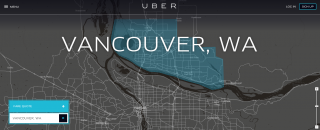Portland is now the largest major city in the United States where the private ride-hailing apps Uber and Lyft aren’t operating — but as of last week, one is now up and running in its largest suburb.
Uber Vancouver, WA launched last week, just ahead of today’s vote by Seattle City Council to fully legalize the services, which remain illegal under Portland’s taxi regulations.
The apps essentially let ordinary drivers turn their cars into taxis, much like Getaround turns private cars into Zipcars and Airbnb turns spare bedrooms into hotel rooms. They also open up big liability issues — especially when one of them claims that it isn’t liable for damages when one of its drivers kills a six-year-old in between fares. But the compromise Seattle approved today sets requirements for the insurance that these drivers-for-hire must acquire.
Uber’s new Vancouver service, which was tested Sunday by KGW-TV, allows people to hail a ride leading outside Vancouver’s urban area (including Portland) but not a ride coming back. Rides cost $1.50 plus $1.65 per mile, with a minimum fare of $6. In some cities Uber also offers a higher-cost service with professional drivers, UberBlack, but that service isn’t available in Vancouver.
Uber and Lyft drivers have the right to refuse fares.
Advertisement
According to the fast-growing ride-hailing services’ websites, of the country’s top 40 metro areas, there are only two that don’t currently offer either Uber or Lyft: Portland and Las Vegas.
Last month in Austin, both companies launched even though they’re illegal in the city. Uber and/or Lyft are also operating in cities like St. Louis, Mo.; Modesto, Calif.; Toledo, Ohio; Greenville, SC; Annapolis, Md. and Fort Collins, Colo., among many others.
Last year, Uber used an ice cream delivery stunt to draw attention to an unsuccessful bid to change Portland city code.
The company turned heads last month when it was valued at $17 billion, a sign that investors see its technology as a major improvement over taxis and, maybe, a gateway to self-driving car services that could dramatically reduce urban car ownership by making carsharing more convenient.
Uber, Lyft and smaller startups such as Sidecar, sometimes known as transportation network companies or TNCs, differ from taxis in that they let users hail rides using a smartphone app; they assume cashless, tipless transactions by keeping users’ credit cards on file; and they map the route for both driver and user.
Crucially, they’re also less regulated than taxi companies. As of 2012, Portland city code allows only 432 taxis to pick up fares within city limits, creating one of the lowest taxi supplies in North America.
It’s possible that by making taxi services more prompt or pleasant, ride-hailing apps are reducing drunken driving. In today’s Monday Roundup, we linked to stories from three cities that showed a possible association.
Local taxi companies and drivers are surely watching these companies with interest. Commenting beneath this morning’s roundup, reader PJ wrote that “living in a household supported by cabbing we are making plan B and C on how to deal with this right now. I would rather get in a cab with a licensed and trained cabbie any day over some random stranger with an iPhone.”
Of course, TNCs also create new jobs, or at least income streams, for their own drivers.
“Drivers are live and on the road,” Uber spokeswoman Brooke Steger wrote in an email Monday. “We are still actively partnering with new drivers though and will continue to work to build reliable supply.”


